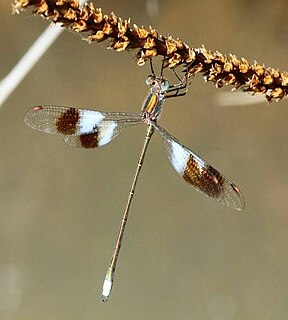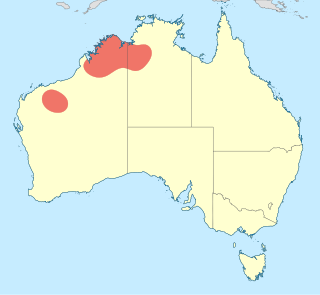
Malachite is a copper carbonate hydroxide mineral, with the formula Cu2CO3(OH)2. This opaque, green-banded mineral crystallizes in the monoclinic crystal system, and most often forms botryoidal, fibrous, or stalagmitic masses, in fractures and deep, underground spaces, where the water table and hydrothermal fluids provide the means for chemical precipitation. Individual crystals are rare, but occur as slender to acicular prisms. Pseudomorphs after more tabular or blocky azurite crystals also occur.

Chlorolestes is a genus of damselflies in the family Synlestidae. They are commonly known as Malachites.

Chlorolestes draconicus, the Drakensberg malachite, is a species of damselfly in the family Synlestidae.

Ecchlorolestes nylephtha is a species of damselfly in the family Synlestidae known commonly as the queen malachite. It is endemic to South Africa, where it is known only from the Eastern Cape and Western Cape provinces.

Ecchlorolestes peringueyi is a species of damselfly in the family Synlestidae. It is commonly known as the marbled malachite.
Phylolestes is a monotypic genus of damselflies in the family Synlestidae. It contains the single species Phylolestes ethelae, the Hispaniolan malachite. It is endemic to the island of Hispaniola, where it occurs in both the Dominican Republic and Haiti.
Malachite is a carbonate mineral.

Platystictidae is a family of damselflies, commonly known as shadowdamsels. They look very similar to the threadtail damselfly family (Protoneuridae). They can mostly be found throughout Asia, Central America, and South America.

The Synlestidae are a family of damselflies commonly known as sylphs or malachites. They occur in South Africa, Australia, and South America.

Diphlebiidae is no longer recognised as a biological family. It was the name given to a small family of damselflies, the azure damselflies, with species in two genera: Diphlebia and Philoganga. Diphlebia is found in Australia and Philoganga is found in Southeast Asia. They are large and thick-bodied damselflies. They rest with their wings spread out. The Diphlebiidae were also known as Philogangidae.

Chlorolestes fasciatus, the mountain malachite or mountain sylph is a species of damselfly in the family Synlestidae. It is found in Lesotho, South Africa and Swaziland. Its natural habitat is montane streams.

Chlorolestes tessellatus, the forest malachite or mosaic sylph is a species of damselfly in the family Synlestidae. It is endemic to South Africa. This shade-loving species is found at seeps and streams in forests and wooded valleys.

Chlorolestes conspicuus, the conspicuous malachite is a species of damselfly in the family Synlestidae. It is endemic to south-western South Africa. This species is found at rivers and streams in both open and wooded valleys.

Chlorolestes umbratus, the white malachite is a species of damselfly in the family Synlestidae. It is endemic to southern South Africa. This species is found along rivers and streams in both forest and fynbos.
Umma gumma is a species of damselfly in the family Calopterygidae. The genus name was established in 1890 and this species described in 2015 from Africa was found to belong to the genus. The species was named after the Pink Floyd album Ummagumma.

Nososticta liveringa is a species of Australian damselfly in the family Platycnemididae, commonly known as a malachite threadtail. It is endemic to northern Western Australia and western Northern Territory, where it inhabits streams and lagoons.
Megalestes is a genus of malachite in the damselfly family Synlestidae. There are at least 20 described species in Megalestes.
Remartinia is a genus of darners in the dragonfly family Aeshnidae. There are at least four described species in Remartinia.












